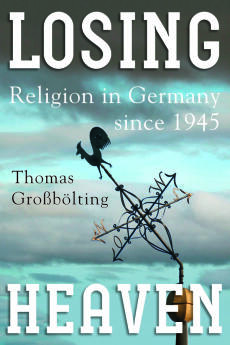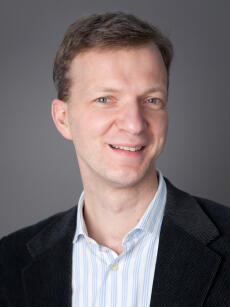“Losing Heaven”
First synopsis of religions in Germany since 1945 by contemporary historian Großbölting published in English

The first synopsis of faith in Germany since 1945, undertaken by contemporary historian Prof. Dr. Thomas Großbölting from Münster University’s Cluster of Excellence “Religion and Politics”, was published in English by Berghahn Books under the title of “Losing Heaven”. In the monograph, which was first released in German under the title of “Der verlorene Himmel” in 2013, the author describes the profound changes that have taken place in the religious landscape in Germany since World War II.
“Being the birthplace of the Reformation, Germany saw some of the most significant developments in the history of European Christianity”, the historian explains. “Today, however, the country’s religious landscape is such that earlier generations would barely recognise it.” The historical analysis of religious life in Germany describes the road to a society that has changed profoundly today: “Christian parishes are diminishing, private piety is decreasing and public life has almost entirely lost its Christian character. However, a flourishing market of syncretistic and individualistic forms of ‘popular religions’ remains.” The book “Loosing Heaven” retraces the dramatic changes and explains their consequences for religious communities in Germany today and for the community as a whole.
According to the study, about two thirds of the German population today are still members of a Christian church. Around 1950, this number amounted to 95 per cent. Participation in church life is continuously on the decline. “Christianity has become one provider among many for the endowment of meaning and for the organisation of Sundays.”
“Churches are favoured, Islam is disadvantaged”
“There is no Christian Germany any more”, the contemporary historian emphasises. “Rather, the number of religious political conflicts is rising.” Still, politics and the churches in Germany remain in the 1950s. “Based on the postwar model, the Christian churches are still favoured by the state, even though a large number of religions has been added”, according to Großbölting. A farsighted kind of politics that treats all religious communities equally is not in sight. “Instead there is the system of an imperfect separation of church and state that developed in the postwar period”, says Großbölting. “Much of it remains to this day: church tax, religious education at state schools or the seat of church representatives in broadcasting committees.” The rights and demands of people of different faith and of the growing group of irreligious people, however, go by the board. Islam in particular is hitting a “glass ceiling”.

According to the scholar, the close cooperation between state and church is rooted in the 1949 Basic Constitutional Law of the Federal Republic of Germany, which adopted essential regulations from Germany’s 1919 Weimar Constitution. “At a time when society was predominantly Christian in character and when an ideational fresh start after National Socialism was sought after, this conjunction worked perfectly well for politics and the churches.” In the 1950s, the churches provided ideals and ways of life for many areas such as family, sexuality, education, but also for political drafts. “What was then considered a moral milestone was no more than one position among many two decades later.”
Christianity is one provider among many today
In his detailed study, the historian portrays the religious change in the former Federal Republic, in the GDR and in re-united Germany. He draws a line from the ideal of re-Christianisation after 1945, from conflicts regarding sex, family and authority as well as the church crisis in the 1960s, from the pluralisation starting in the 1970s and the special case of East Germany to the growing Islam and Judaism in Germany. The scholar analyses three factors in particular here: practiced religiousness; the relationship of religion and society; and the change within the churches, for example with a view to theology and church congresses.
The book from 2013 presents the results of project C22 at the Cluster of Excellence, “Transcendental bestowment of meaning and religious collectivisation postmodern Europe”. The author is professor for modern and contemporary history at the History Department of Münster University. At the Cluster of Excellence, he is currently head of Project C2-8, “New social movements and religious social forms after modernity: a comparison of Germany and North America”. (ill/vvm)

